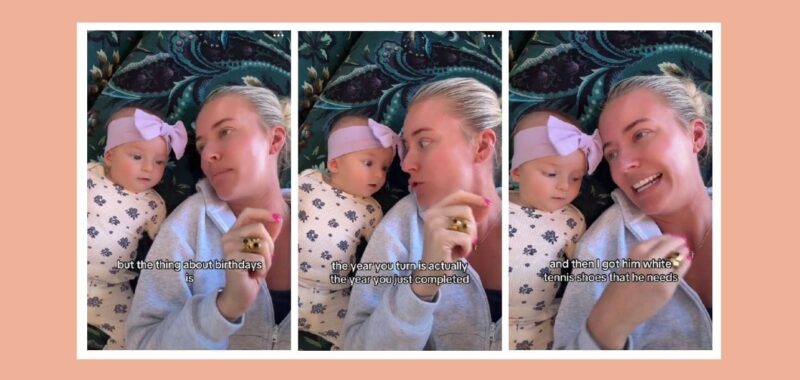A mom holding her baby, narrating her day like they’re on a reality show confessional—whether they’re touring a new house, getting dropped off at a nanny share, or just reflecting on what’s in the group chat. No baby talk. No sing-song voice. Just a constant, hilarious stream of consciousness, delivered to an adorable baby girl with all the intensity of a therapy session. That’s the whole bit—and people can’t get enough.
@justalexbennett, content creator and new mom makes this kind of conversation with her infant daughter a recurring feature on her TikTok, drawing attention to the hilarity, and science, of how we talk to our kids as they grow. One video alone has racked up 14.7 million views, and the comment section is basically a fan club:
- “Her first word will be a paragraph!” – @walker
- “This might actually be helping MY development 😭” – @your.fav
- “i imagine this is how lorelai spoke to rory” – @tay
- “No because my toddler is my only friend who doesn’t interrupt me either.” – @gingerbrina
- “I think this counts as speech therapy and therapy-therapy.” – @itscarinab
It’s funny. It’s deeply relatable. And according to science? It’s actually helping her baby’s brain grow.
Talking to your baby like an adult boosts language skills
Most of us are familiar with infant-directed speech—that high-pitched, exaggerated tone parents naturally use with babies. Researchers believe it helps infants pay attention, recognize sounds, and learn language faster because it exaggerates the cues they need to decode speech.
But adult-style speech can be powerful too—just in different ways.
- Narration-style speech (“We’re getting dad chocolate cake because it’s his favorite…”) helps babies understand routines and emotions.
- Conversational tone (like Alex’s) models how people talk in real life, building listening skills and trust.
- Emotionally honest talk (“This is stressful, but I’m trying…”) gives kids language for feelings—even if they don’t understand every word yet.
The National Library of Medicine found that babies who were spoken to using rich, adult-like language were able to process words faster and developed larger vocabularies by age 2. The researchers stressed that it’s not just about the amount of words babies hear—it’s about the quality of conversation.
Enter: The talent that is Alex Bennett giving a monologue about, well, just about anything.
Related: Ms. Rachel explains the importance of speaking ‘parentese’ to littles: ‘This is not baby talk’
Real-life conversation beats baby talk
“Conversational turns,” or back-and-forth exchanges—even if your baby is just cooing or smiling—are one of the strongest predictors of future language and cognitive development. MIT cognitive scientists even linked those early interactions to increased activity in the brain regions responsible for speech and comprehension.
Speech-language pathologists often recommend narrating your day to your baby using full, expressive sentences. Not only does this expose them to natural language patterns, but it also makes those early interactions feel more human and emotionally attuned.
Dr. Dana Suskind, founder of the Thirty Million Words Initiative and author of Parent Nation, describes parents as “brain architects. The words you speak—yes, even your hot takes on Target restocks—literally help shape your baby’s developing brain.
So if you’re sitting there giving your baby a TED Talk about why you’re unfollowing your cousin on Instagram, you’re doing more than venting—you’re helping them learn how to listen.
Related: This is how “baby talk” affects little ones learning two languages
“Her first word will be a paragraph”
Some critics might argue this is more for mom than for baby—but that’s kind of the point. Early motherhood is notoriously isolating. A 2021 study in BMC Pregnancy and Childbirth found that up to a majority of new moms feel lonely in those early months. So talking—really talking—to your baby can help moms feel more connected, grounded, and heard (even if the baby just stares blankly while chewing on a sock).
So yes, maybe your baby doesn’t understand the politics of your HOA board, but talking to them like they do just might help them develop stronger communication skills—and make you feel a little more like yourself in the process.

